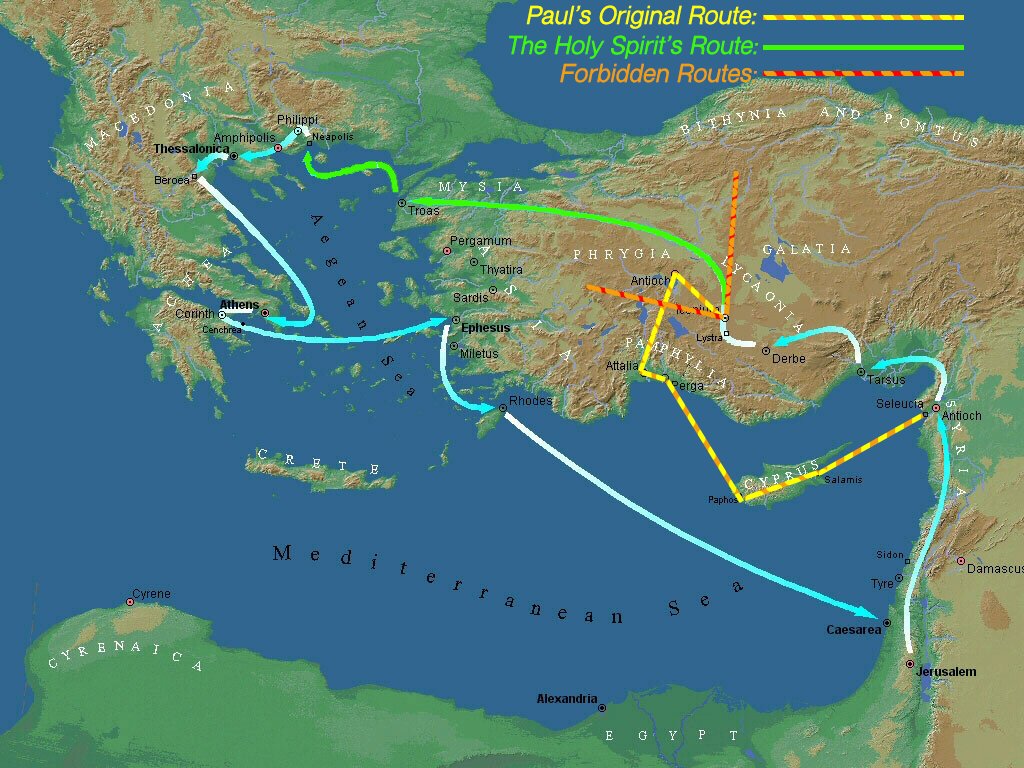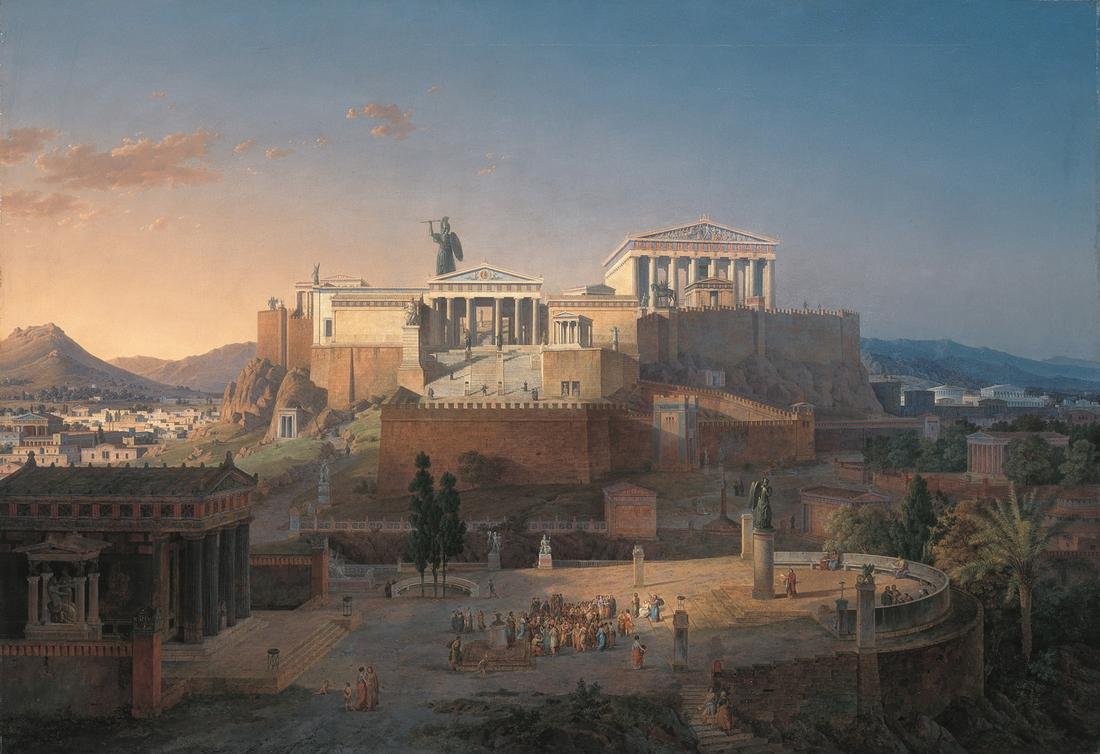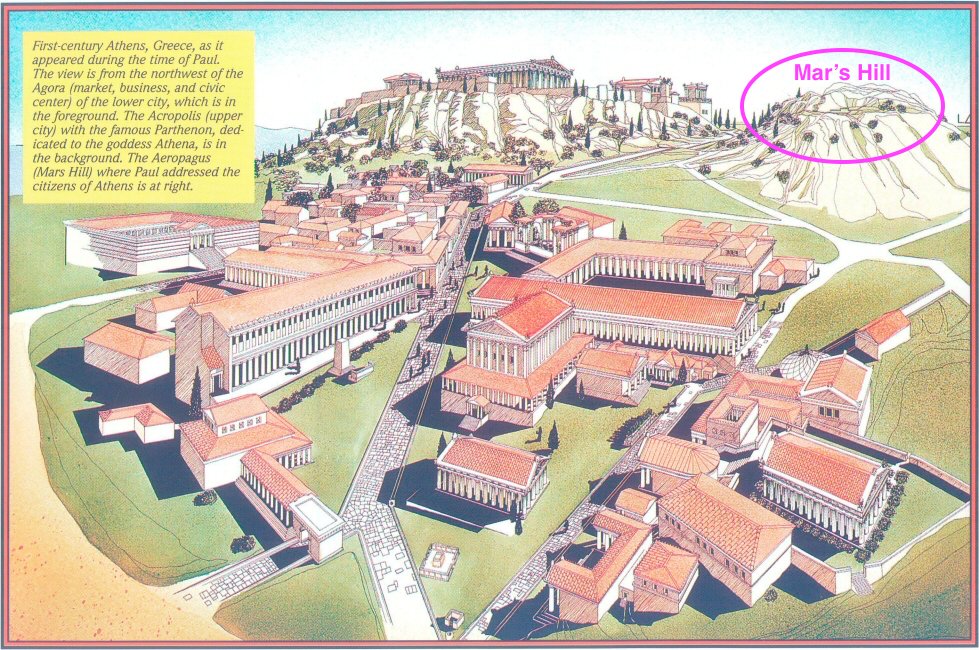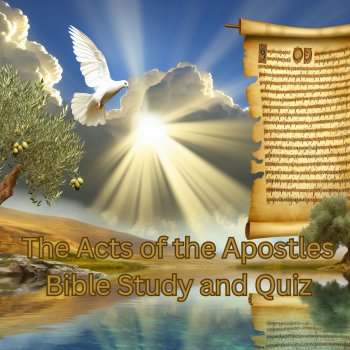Blog Post
Posted by Dion Todd August 5th, 2018 4,222 Views 0 Comments
Today we are going to study Acts chapter 17 in depth. You can follow along in your own Bible if you like. I will be reading from the World English Bible because it is the only modern English translation that is copyright free, and I can read the entire Bible on video without any legal drama or breaking anyone’s rules. After you finish this study, please take the accompanying quiz to test your knowledge. Thanks to everyone that has participated so far. Let’s get started:

After this, Paul had a vision of a man calling for help in Macedonia, so they made their way to Philippi and preached the good news to a woman named Lydia and others who were gathered by the river there. Paul cast a spirit of python out of a slave girl, and he and Silas were soon beaten and imprisoned, but after an earthquake, they led the jailer and his family to the Lord and baptized them. The first church in Europe was established in Philippi, and fresh out of jail, they moved on. That is where we begin our story today.
Acts Chapter 17 beginning in verse 1, reading from the World English Bible: Now when they had passed through Amphipolis and Apollonia, they came to Thessalonica, where there was a Jewish synagogue.
Thessalonica was an important port city, and when traveling by foot from Philippi, at least a three-day journey of about 100 miles. It was a thriving city and had a population of about 20,000 people. Modern Thessalonika is the second largest city in Greece with over one million inhabitants today. It was named after the half-sister of Alexander the Great. Unlike Philippi, there was a Jewish synagogue here, and it was tradition to invite visitors to speak, so Paul went there on the Sabbath.
2 Paul, as was his custom, went in to them, and for three Sabbath days reasoned with them from the Scriptures, 3 explaining and demonstrating that the Christ had to suffer and rise again from the dead, and saying, “This Jesus, whom I proclaim to you, is the Christ.”
Paul reasoned with them using what they already knew about Scripture. They already knew about Abraham, Moses, and Isaiah, so he leveraged their existing knowledge to explain Jesus to them. He did not demand that they swallow what he said simply because he said it, but each person was free to believe it or not. Any message that restricts another’s freedom to choose for, or against Christ, is wrong. The gospel will always stand on its own.
Though it tells us that Paul preached in the synagogue for only three Sabbaths, his letters indicate that he and the others stayed in Thessalonica much longer than this. Maybe they stopped inviting him to speak in the synagogue as the Jews became jealous of the growing crowds.
According to Philippians 4:15–16, the new Christians at Philippi sent him financial support during this time to help him. We can see here that God uses His people, to bless His people. He will use you to bless others, and then others to bless you. Paul wrote:
Philippians 4:15–16 WEB. You yourselves also know, you Philippians, that in the beginning of the Good News, when I departed from Macedonia, no assembly shared with me in the matter of giving and receiving but you only. 16 For even in Thessalonica you sent once and again to my need.
Even the Apostle Paul had material needs, he needed things like food, and how did God meet them? Through His faithful and obedient people giving. God could have rained down gold on Paul, but He chose to give His people an opportunity. Jesus said “Give and it will be given to you”. It’s a circle: God tells us to bless someone, and when we do, He tells someone to bless us. If you are not being blessed then perhaps you missed step 1, first be a blessing to someone else.
4 Some of them were persuaded and joined Paul and Silas, of the devout Greeks a great multitude, and not a few of the chief women. 5 But the unpersuaded Jews took along some wicked men from the marketplace, and gathering a crowd, set the city in an uproar. Assaulting the house of Jason, they sought to bring them out to the people.
Many of the people at the synagogue believed Paul, but the ones that did not became envious of the attention that he was getting. This had happened at Pisidian Antioch (Acts 13:45, 50), at Iconium (Acts 14:2, 5), and at Lystra (Acts 14:19) during the first missionary trip. So once again, Paul was opposed by a mob that was incited by jealous Jews.
Jason was a Christian in Thessalonica whose house seems to have been a center for the new church there. The envious Jews determined to get rid of Paul and Silas and they formulated a plan to bring them before the assembly on a charge of sedition, causing a riot in the city, which was a very serious charge. To give some grounds for this charge, they rounded up some bad characters from the marketplace and organized them into staging a riot (1 Thess. 2:14–16). When everything was set for framing the missionaries, they rushed to Jason’s house in search of Paul and Silas but did not find them. Without them they could hardly appear before the assembly. So in frustration, they seized Jason and some other brothers there.
6 When they didn’t find them, they dragged Jason and certain brothers before the rulers of the city, crying, “These who have turned the world upside down have come here also, 7 whom Jason has received. These all act contrary to the decrees of Caesar, saying that there is another king, Jesus!”
As they had done at the trial of Jesus, they twisted their words and tried to use it against them. Being that Rome had conquered most of the known world at the time, saying that there was another king besides the emperor was considered treason and a serious offense. This could be why Paul avoided using the word “King” or “Kingdom” in his letters as it could be twisted and used against the Christians living there.
8 The multitude and the rulers of the city were troubled when they heard these things. 9 When they had taken security from Jason and the rest, they let them go.
The rulers listened to the charges but were apparently not convinced because they let Jason and the others go. In general, Roman officials did not care what the people believed. Yet when the public order was disrupted by riots, they came down with an iron hand. If things got out of hand, it wouldn’t be long until the Emperor dispatched his legions to restore order, and no one wanted that. So Jason and the others had to pay a security deposit, or a bond, and agree that there would be no more trouble in the city from his house, even though he did not start the riot.
10 The brothers immediately sent Paul and Silas away by night to Berea. When they arrived, they went into the Jewish synagogue.
If Paul had been facing his own persecution, they could not have driven him away, but because Jason and the others had promised their money and their word that there would be no more trouble, he and Silas left Thessalonica quietly during the night. Paul wanted to spend more time there and many people believe that 1st Thessalonians was his first letter written to a congregation. Paul and Silas traveled to Berea and went to the Jewish synagogue there.
11 Now these were more noble than those in Thessalonica, in that they received the word with all readiness of mind, examining the Scriptures daily to see whether these things were so.
The Bereans eagerly listened to what Paul said, and then examined the Scriptures daily to see if those things were true. Because of this, Scripture tells us that they were of more noble character than the Thessalonians. Believing everything that you hear is not being a noble Christian at all. We should eat what is good, and throw out the bones. No one knows everything, and if you follow anyone for very long you will learn this. That is why studying the Bible is so important, so you know what is in there and you have read it for yourself.
12 Many of them therefore believed; also of the prominent Greek women, and not a few men. 13 But when the Jews of Thessalonica had knowledge that the word of God was proclaimed by Paul at Beroea also, they came there likewise, agitating the multitudes.
The envious Jews in Thessalonica were not satisfied to drive Paul out of only their own city. They even followed Paul to Berea to stop his work there also. He had developed quite a following of enemies that would travel miles to interrupt his meetings. This was the fifth city Paul was run out of by an angry mob, who were stirred up by angry and envious Jewish leaders.
14 Then the brothers immediately sent out Paul to go as far as to the sea, and Silas and Timothy still stayed there.
The Christians in Berea sent Paul away to Athens, fearing for his life, and the danger to the work that was going on there. Apparently, the envious Jewish leaders despised and targeted Paul, so both Silas and Timothy stayed behind to teach and take care of the new Christians in Berea while Paul moved on. The fact that both Silas and Timothy remained there showed that Paul had a passion for planting and growing churches, not just making converts. It also showed that Paul didn’t believe that he alone could do everything. People like Silas and Timothy were needed to teach and strengthen the new Christians.
15 But those who escorted Paul brought him as far as Athens. Receiving a commandment to Silas and Timothy that they should come to him very quickly, they departed.

Even though the Romans conquered Athens in 146 B.C. Athens retained her supremacy, because the Romans loved everything Greek, and so did not change her status as a free city. Despite all her glory, Athens was empty because she was living on the memories of the past. In philosophy she simply repeated the echoes of men who were long gone. Her art was no longer inspired but a lingering reflex. It was to such a city that the apostle Paul came—proud, glorious to the eye, but dead.
When Paul arrived and saw the state of the city, he apparently sent for Silas and Timothy to come to him. We learn from 1 Thessalonians 3:1–2 that Timothy did join Paul in Athens, but he was later sent back to strengthen and encourage the Thessalonians. Silas, it appears from Acts 18:5, did not arrive from Berea, until Paul had gone to Corinth.
16 Now while Paul waited for them at Athens, his spirit was provoked within him as he saw the city full of idols.
Paul, like any tourist, was ready to be impressed by this famous and historic city—which, hundreds of years before, was one of the most glorious and important cities in the world. But when Paul toured Athens, he was only depressed by how much idolatry he saw all around. The paintings, statues, and works of art were of idols and Greek gods. The idea behind “given over to idols” is really “swamped by idols”.
The Apostle Paul stared long and hard at what he saw, for the city was truly “full of idols.” Pausanius, a Greek traveler and geographer, visited Athens fifty years later and said it was easier to meet a god or goddess on the main street of Athens than to meet a man. This was statistically true because the population was about 10,000, but there were 30,000 statues of gods. The streets lined with idols of false deities, framed by the architectural magnificence of the Parthenon and the Acropolis, were dazzling to the eye. Paul may not have intended to preach until Silas and Timothy arrived, but he was so greatly distressed by what he saw that he could not resist, his spirit was “provoked within him”.
17 So he reasoned in the synagogue with the Jews and the devout persons, and in the marketplace every day with those who met him. 18 Some of the Epicurean and Stoic philosophers also were conversing with him. Some said, “What does this babbler want to say?” Others said, “He seems to be advocating foreign deities,” because he preached Jesus and the resurrection.
Paul began speaking with anyone who would talk to him, and he found three groups of listeners—the religious, “the Jews and the God-fearing Greeks” in the synagogue, the street-variety pagans in the marketplace, and intellectual philosopher-types called “Epicurean and Stoic philosophers.” These last two groups represented the competing philosophies of the day in Athens, which happened to be the religious capital of Greece.
The Epicureans pursued pleasure as the chief purpose in life. They believed that everything happens by chance, and death is the end of it all, no afterlife. They valued most of all the pleasure of a peaceful life, free from pain, disturbing passions and superstitious fears, including the fear of death. Epicureans believed there are gods, but those gods have nothing to do with the world.
The Stoics believed that the universe and everything in it was god, that god was in everything. So they believed that all things, good or evil, were from “god,” and so nothing should be resisted, and they believed there was no particular direction or destiny for mankind at all. That whatever happened to them, was their destiny. Consequently, they lived in fatalistic resignation. Nothing they did mattered, so why bother.
Together, these two philosophies represented the popular pagan alternatives for life apart from Christ. Paul upset them both, so they wrapped their response in sarcasm calling Paul a babbler. However they reacted, Paul continued to preach Jesus and the resurrection.
19 They took hold of him and brought him to the Areopagus, saying, “May we know what this new teaching is, which you are speaking about? 20 For you bring certain strange things to our ears. We want to know therefore what these things mean.” 21 Now all the Athenians and the strangers living there spent their time in nothing else, but either to tell or to hear some new thing.
The Athenians pursued modern thought, the sensational, the whims of the hour. After Paul had preached several days in the marketplace, he got their attention and the crowd brought him before the Council of Ares, or “Mars”, the highest council, or court in Athens.

22 Paul stood in the middle of the Areopagus, and said, “You men of Athens, I perceive that you are very religious in all things.
Paul’s approach was brilliant and inspired by the Holy Spirit. As courteously as possible, he complimented them on being “in every way…very religious.” Paul was undoubtedly eager to protest their idolatry and point them to the truth, but he restrained himself and gave them a genuine compliment first. He met them where they were. “In my stroll around your beautiful city I found an altar to an unknown god. Let me tell you about the one who you are worshiping.” He established common ground with them.
23 For as I passed along and observed the objects of your worship, I also found an altar with this inscription: ‘TO AN UNKNOWN GOD.’ What therefore you worship in ignorance, I announce to you.
Athens was filled with statues dedicated “to the unknown god”. Six hundred years before Paul, a terrible plague came on the city and a man name Epimenides had an idea. He let loose a flock of sheep through the town, and wherever they lay down, they sacrificed that sheep to the god that had the nearest shrine or temple. If a sheep lay down near no shrine or temple, they sacrificed the sheep to the “unknown god”. They wanted all their bases covered, so to speak.
The Athenians took pride in their knowledge and were supposed to know everything, but on the most important truth they came up short—they did not know God. The word translated “unknown” here is the root from which we get agnostic from, which means “without knowledge.” Paul began to tell them about the one God they did not know.
24 The God who made the world and all things in it, he, being Lord of heaven and earth, doesn’t dwell in temples made with hands. 25 He isn’t served by men’s hands, as though he needed anything, seeing he himself gives to all life and breath, and all things.
God is the Creator: “the God who made the world and everything in it.” That may not sound earth-shaking to us today, but it challenged their whole theology then. The Stoics believed the universe was God, and the Epicureans were practically atheists. Paul’s declaration denied the beliefs of both groups. The next statement in verse 25 that God is the Lifegiver, directly attacked the Epicureans’ belief that God was absent and the Stoics’ belief that He was in everything. As the giver of life, God is actively here, but He is not contained in creation, for He created it.
26 He made from one blood every nation of men to dwell on all the surface of the earth, having determined appointed seasons, and the boundaries of their dwellings, 27 that they should seek the Lord, if perhaps they might reach out for him and find him, though he is not far from each one of us. 28 ‘For in him we live, move, and have our being.’ As some of your own poets have said, ‘For we are also his offspring.’
Paul was a master communicator, and here he quoted a couple of their own poets in order to maintain rapport and keep their interest. The first part of verse 28, “For in him we live and move and have our being,” is from the work of Epimenides. The final line in verse 28, “We are his offspring,” is from the writings of Aratus, a Greek poet.
29 Being then the offspring of God, we ought not to think that the Divine Nature is like gold, or silver, or stone, engraved by art and design of man. 30 The times of ignorance therefore God overlooked. But now he commands that all people everywhere should repent, 31 because he has appointed a day in which he will judge the world in righteousness by the man whom he has ordained; of which he has given assurance to all men, in that he has raised him from the dead.”
Paul told them that men are to repent of idolatry because judgment is coming. Mankind is not moving toward extinction as the Epicureans thought, nor toward absorption into the cosmos as the Stoics thought. Instead, mankind is moving toward divine judgment. Moreover, our Judge is a resurrected man. The philosophers did not like this at all. Five hundred years earlier Aeschylus had written, “When the dust has soaked up a man’s blood, once he is dead, there is no resurrection,” and this was a popular Greek sentiment in Paul’s day.
32 Now when they heard of the resurrection of the dead, some mocked; but others said, “We want to hear you again concerning this.” 33 Thus Paul went out from among them. 34 But certain men joined with him and believed, among whom also was Dionysius the Areopagite, and a woman named Damaris, and others with them.
The audience listened until Paul started talking about idolatry, repentance, and judgment, then he lost many of them. His sermon had three results—mockery, delay, and belief. The first two responses show that many did not really care about truth. Some said, “what a waste of time!” When the discussion went beyond fun and games, they cut it off. Others said, “We want to hear you again,” but they cared little whether they actually did or did not, and they never did hear him again.
Verse 33 and the opening verse of chapter 18 tells us that: “Paul left the Council.… After this, Paul left Athens.” Some truly believed and came to faith, but most of them apparently rejected the apostle’s message and the Savior he proclaimed. When men were angry with him, Paul argued with them. When he was persecuted, he returned again to the place of persecution. But for intellectual insincerity he had no stomach, and he left them behind. Fortunately Dionysius, who was one of the council members, and Damaris believed Paul and were saved.
It is so important to not treat the Holy Spirit with indifference. Jesus said in Revelation 3:15-16 WEB “I know your works, that you are neither cold nor hot. I wish you were cold or hot. So, because you are lukewarm, and neither hot nor cold, I will vomit you out of my mouth.” Jesus said that to the church of Laodicia.
If we are believers, if we truly know Christ, we must never hear or read God’s Word in a detached manner. We must pay attention to God with all our being. We must always respond. Jesus stated the principle beautifully in Matthew 13:12 WEB: “For whoever has, to him will be given, and he will have abundance; but whoever doesn’t have, from him will be taken away even that which he has.”
One of the great sins of the church today is the dispassionate hearing of God’s Word. Because of this, there are many who are spiritually ill, and unable to comprehend the truths anymore that they once held dear. Only God can deliver us from such spiritual deadness.
Heavenly Father we pray that You will deliver us from lukewarmness. Let us hear what You have to say and let it cut to the heart. Shake us up, break us out of our shell, deliver us and may we thirst for You like never before, in the name of Jesus Christ I pray.
This concludes today’s chapter of our ongoing Bible Study. Thank you for participating and being a part of Refreshing Hope! To complete this study, we invite you to test your knowledge with the accompanying quiz!

This blog post has an accompanying Bible quiz: Acts Chapter 17

